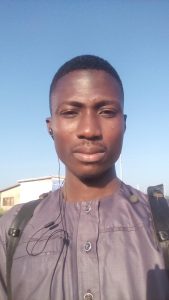Justice Joseph Prah is from Accra, a poet who believes in poetri-evolution, by a vibrant generation.

What drew you to enter for the competition?
It is just one driving force, an urge to be part of a continental history African haiku
poets are once again inscribing down for posterity. I personally belong to the school
of thought which believes in the ground thinking that if Africa’s poetriscape would
continue to sustain its formidability and resilience in the face of those exclusive 21st
century adversities, then keen contest of this caliber must often be organised to unearth
the latent talent in young but vibrant generation; a class of poets more poised to the teeth to
introduce what I always refer to as poetri-evolution.
Do you have a particular personal story with haikus?
Great question! Where do I start from? My word! Let’s say at the early part of 2015 I wonderfully met a crop of haiku geniuses with exceptionally creative prowers to write the art! I sincerely got jerked up to the art and since reached the resolute decision to practice it myself. In fact, the rotational tenet on which Ku is fundamentally hinged is what comes to me as a matchless fascination which the likes of Ezra pound, Robert Frost, Kofi Awoonor and Wole Soyinka may have missed and are still missing entirely during their writing epoch.
What do you feel towards the shortlist in general?
Honestly, as a keen haiku analyst in Africa, I am summarily excited the historical register of Afriku poets is evidenty stretching on and on. The shortlisted Afriku poems show an incredible gamut of wisdom which, in my view, is undeniably equal the girth of the Golden Boabab. Those are topnotch literary crystals worth mounting in a gallery any season. Every icon who successfully migrated through thorough scrutiny onto the shortlist has proven to be an African and not an Africant in practising the ancient Japanese poetry.
What motivation do poets need, to keep writing, in this ridiculously competitive world that vies for their attention?
You see the active stimulant that could spur poets on to pursue a sustainable poetry career is factually relative. However, our individual variances can be tailored into one pursuance to work out for the common good of the continent. It will be necessary for key players like Pan-African Writers Association and their contemporaries to cajole many home-bred poets to frequently use the quill. These associations should do more than they are currently doing to encourage young African writers write for the libraries and the world beyond. Currently, their gesture toward Afriku is absolutely nothing to commend. Yes. Aside that it would be incumbent on every one of us to bring his or her own cream to the table! What do I mean by this? You see, when you come to the writing bench and it is literally crowded with various intellect, you have to do meticulous brainpress up, and this is what many of us especially African novelists, dramatists and poets have to do to jostle our way into the writing universe. Let us cash on a particular style of writing, surf through the debris of subject matters and themes and select the most suitable ones that have the steam to attract readers within and beyond our horizon( Africa). We must ready ourselves to write about our past, present and future solely for the continent, and explore the more the Afromodern matters so pertinent to Africans.
If your 2017 submission was food, what would it be?
Wooow! You guys are really there! Hahah! Akple and okra soup with fried “keta schoolboys” hearings. Thank you.
Read his haiku here:
harmattan mango
the first ripening
in the midday sun
We at Babishai, congratulate him again. The winners will be announced at the #Babishai2017 Poetry Festival dinner on Sunday 6 August at Humura Resort, Kitante Close. Cards are on sale at 40,000/- Call +256 703147862. The full festival programme is here.
#BABISHAI2017 POETRY FESTIVAL PROGRAMME
The full winning haikus are here:
http://bnpoetryaward.blogspot.ug/2017/07/the-babishai-2017-haiku-shortlist.html

